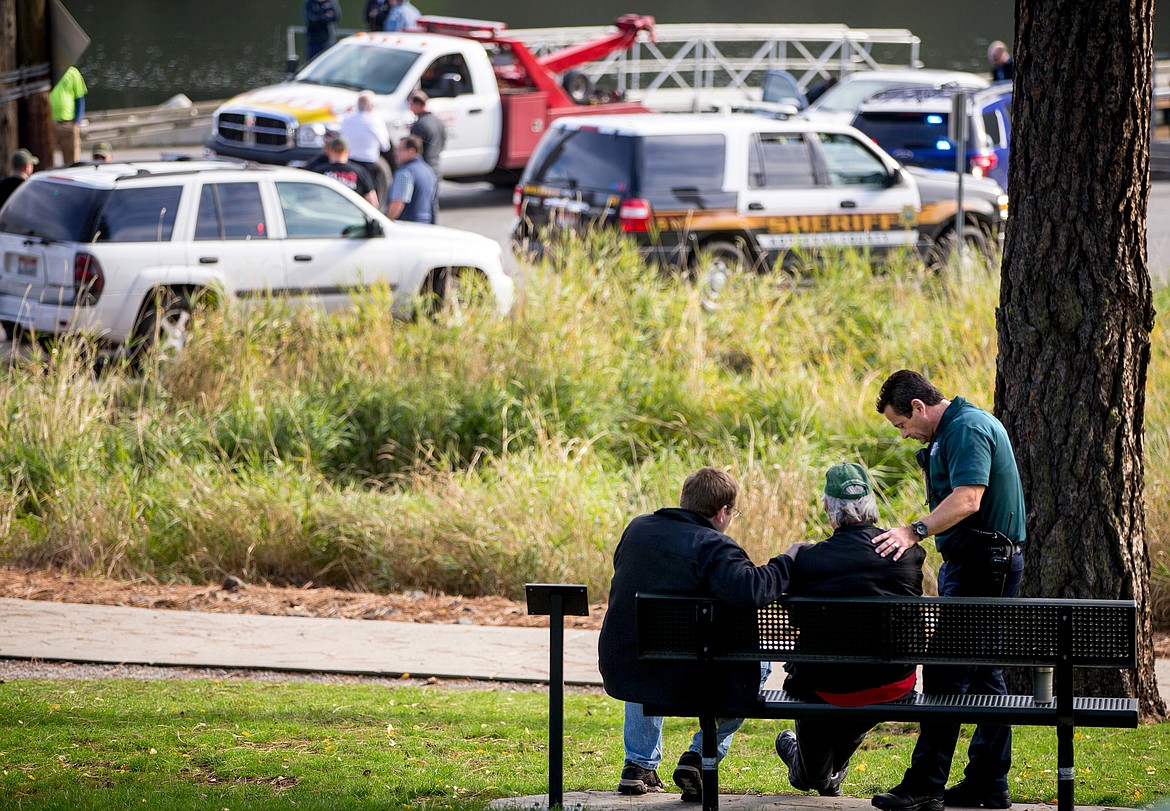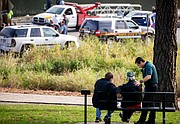Hope for the hurting
Kevin Croffoot still hears from the "angel" who appeared after tragedy struck in June.
After the 16-year-old son of the Northern Lakes Fire District battalion chief committed suicide, Bob Thomas, one of eight chaplains who volunteers for the North Idaho Peace Officers Chaplain Association, was there for comfort and direction.
"He was there for my whole family and, as a parent, I wasn't even sure how to tell the other kids," said Croffoot, adding that Thomas also officiated his son’s funeral. "He's helped us through the process and made a connection with my daughters. He's spent countless hours to help us and, to this day, he calls to check in or stops by to visit with the girls.
"It was by far the worst time of our lives, but he was a bright spot at that time. He was an angel."
As a fire district employee, Croffoot said he was aware that chaplains are available to assist those who have endured traumatic incidents. However, he said he didn't realize how much time they spend with families.
NIPOCA, formed as a nonprofit out of a loose-knit chaplains group earlier this year, serves the Kootenai County Sheriff's Office and Spirit Lake Police jurisdictions. Other area response agencies use individual volunteer chaplains.
"Our goal is to network with all the surrounding agencies so we can train together, bounce ideas off each other and learn from one another to take care of our community," said Thomas, adding that chaplains also coordinate with local funeral homes and agencies such as the Suicide Prevention Awareness Network (SPAN) to assist families.
"We want to be ready for not if, but when, a mass tragedy happens,” he said.
Thomas said the need for chaplain services tends to spike around the holidays. That’s due both to more incidents and to follow-up visits with victims who are missing loved ones particularly this time of year.
"In the past three weeks we have had a death by rollover accident, two cases of CPR by a loved one where the person died in front of them, and a family member finding their mother, who had died at home alone," Thomas said. "We have had more than 80 callouts during this year alone where the family will be missing that person at the dinner table this year for the first time."
Thomas said the average number of hours chaplains volunteer in a week can range from five to 50. Some are retired, while others have jobs.
"I'm a mortgage broker to support my chaplain habit," Thomas said with a smile.
Thomas said being a chaplain is a "calling."
"People say, 'You've got a hard job,'" he said. "But the way I see it is that it's a high honor."
Thomas also has personal reasons for serving as a chaplain. When he was 23, he came home to find that his father had died of a heart attack.
"From my paramedic training, I knew that he couldn't be revived," Thomas said. "The police officer who responded came to me with tears streaming down his face. He said, 'Bob, you're the man of the house now, so you need to take care of your mom and brother.’ His compassion left a lasting impression that I remember as if it was yesterday. Ever since, I wanted to do something to repay that."
Thomas said chaplains, whose religious backgrounds vary, don't proselytize. Oftentimes, he said, simply being there for victims is the best way to offer comfort.
"We are not out to convert people," Thomas said. "We just want to be there and love on them. They need to know that they are not alone."
At the funeral he officiated for the Croffoots, with approval from the family, Thomas said he spoke to the young people about bullying.
"When kids hear how valuable and precious they are, tears run down their face," he said.
Thomas said some chaplains, including those affiliated with NIPOCA (www.nipocaorg), go on ridealongs and training exercises with responders to get to know them better.
"Chaplains serve two roles — as vitamins and trauma surgeons," Thomas said. "We're vitamins by having a relational environment with officers. From an emotional standpoint, we're there for the initial shock."
Since some chaplains are with law enforcement employees on patrol, many wear bullet-proof vests that they pay for themselves. Thomas declined to comment on whether he or other chaplains are armed.
He recalled driving up with an officer two years ago to notify a family of a fatal car crash.
"The people were unaware of what happened and yelled down, 'What the hell do you want?'" Thomas said. "By the time we left they were hugging the officer and myself. They never looked at law enforcement that way. If we can help change people's perception, that's another win."
KCSO Deputy Matthew Brakeman said he spent time overseas in the Marines and as a contract security officer. As stressful as that work could be, he said, it's not on the same level as being a deputy.
"When you're overseas, you have the ability to disassociate because you're not at home," he said. "When you work for the Sheriff's Office there's dramatic and traumatic calls in your front and backyard — then you go straight home."
That's why, Brakeman said, he appreciates having chaplains available, especially with the increase of traumatic incidents in recent years.
"They're always in the right place at the right time on very short notice," Brakeman said. "They're not selling religion; they're loving on people. They excel at forming relationships."
Brakeman said he and his family have needed comfort after he responded to a series of calls that included overdoses, suicides and attempted suicides.
"The chaplains have stood with us shoulder to shoulder and are an integral part of our team," he said. "They help increase our longevity because we have them as a resource to de-stress."



